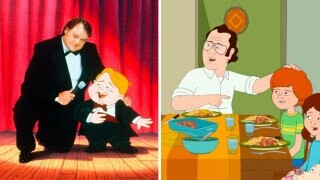Louie Anderson's 'Life with Louie' Walked So Netflix's 'F Is for Family' Could Run

On January 21, the world tragically lost Louie Anderson. A comedian of over 30 years, he made his television debut in 1984 on Rodney Dangerfield's Young Comedians Special and, over the years, took a lot of cues from the man who got two things: 1) Mr. Burns' male-pattern baldness and 2) No respect. A lot of Anderson's humor was self-deprecating, mostly focusing on his weight. But at the same time, it was also … heartwarming and sweet.
There is a great moment in his debut on The Tonight Show (around the 2:03 mark) when Anderson lands a pretty great joke at his own expense and just can't help but smile warmly deep from within him. Not in a "Man, I'm so freaking great" but more like "Ah shucks, I'm glad the audience liked it."
Don't Miss
By all accounts, that was Louie Anderson both on and off the stage. His genuine kindness and good nature were also the basis for the 1994 – 1998 cartoon Life with Louie. Inspired by the comedian's childhood growing up in the Midwest as the child of a woman with a clown-car vagina and a WW2 vet, the show focused on Anderson exploring the complexities of life through the eyes of his eight-year-old self. But the heart of the show was really Louie's dad Andy (also voiced by Anderson), with Life with Louie dedicating a lot of time to trying to understand a man who, from the outside, looked perpetually pissed off and ultimately finding a guy that really cared for his family.
It was a beautiful sentiment, but it wasn't exactly based on a true story. In real life, the comedian's father was an abusive alcoholic. BUT his dad was somehow worse, once taking his wife on a cross-country booze trip, leaving their kids behind until they were taken away and put up for adoption in what can only be described as a child auction. Through this, Anderson's dad got separated from his sister and ended up a … well, "slave" isn't the right word here. "Serf" would probably be closer, as he had to work on a farm owned by the family that took him in but didn't let him eat with them.
It would be so easy for Anderson to be angry at his father. And for a long time, he was. But when working on his cartoon, he took into account his father's Dickensian (with an emphasis on "dick" for "dick move") childhood and concluded that, in light of that, his dad passed on a … softer punch. And the comedian chose to focus on that, dealing with his complex feelings in Life with Louie by voicing his own dad and looking for the good that he was sure was inside him. 20 years later, Bill Burr did basically the exact same thing with F is for Family.
Just like Anderson, Burr voices his own dad stand-in Frank Murphy (also a war vet), on his show and uses it to try and find the human behind a constantly screaming drunk. Both cartoons have a lot of melancholy buried underneath all the jokes, but also plenty of hope that the patriarchs they were portraying weren't complete monsters. They were just the products of their messed-up upbringings and the times they lived in. Life with Louie sugarcoated that message so much that you could get diabetes just by standing near it, but it planted a pop culture seed that eventually made F is for Family possible.
Because even though Burr's show got super dark at times and wasn't afraid to tackle issues like racism, sexism, and homophobia, it did sort of end on a positive note. Frank chills out a bit, focuses less on work, and seems supportive of his kid's dream of becoming a comic. Whether that's how it really went down or not is not important. What's important is that Bill Burr chose to look for the good in the character, and maybe Anderson's show had something to do with it. Even if not, it's a comforting thought, like most of Louie Anderson's career. He looked for the good, and where there wasn't any, he created it with his endearing personality. He will be missed. RIP.
Follow Cezary on Twitter.
Top Image: 20th Television, Netflix